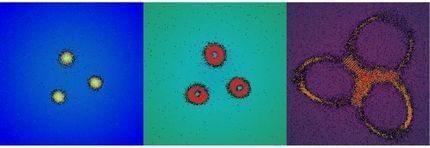A new route to dissipationless electronics
Realization of a new type of magnetic phase in devices opens the door to electronics based on topologically non-trivial materials
A team of researchers at RIKEN and the University of Tokyo has demonstrated a new material that promises to eliminate loss in electrical power transmission. The surprise is that their methodology for solving this classic energy problem is based upon the first realization of a highly exotic type of magnetic semiconductor first theorized less than a decade ago - a magnetic topological insulator.
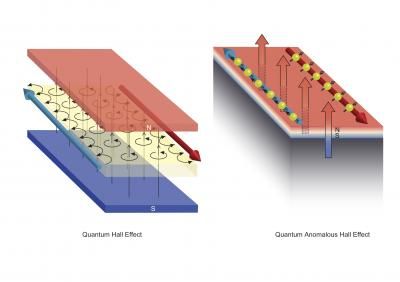
This is a depiction of the quantum Hall effect (left) and the quantum anomalous Hall effect (right).
RIKEN
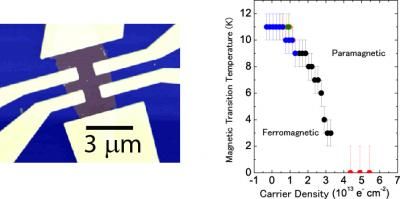
At left, the active area of magnetic topological insulator (dark gray) is 3 microns across and only 70 atoms thick. The blue background is an insulating gate dielectric and the yellow regions are metallic electrodes. At right, the internal magnet favors the "off" state of the transistor on the left. This is evidence for a new type of magnetic semiconductor.
RIKEN
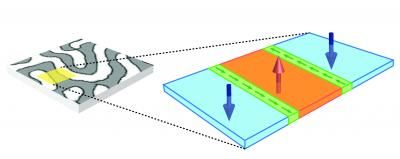
This is a depiction of realization of edge modes on sample surface. At left, a schematic representation of magnetic structure is shown, dark and light representing down and up polarization, respectively. At right, the corresponding edge mode structure is shown, with the green arrows representing chiral modes at magnetic reversal. The electrical current flows in the same manner as in the quantum Hall and anomalous quantum Hall states.
RIKEN
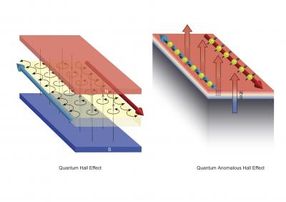
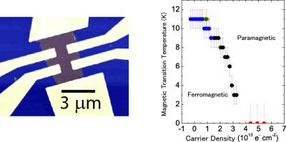
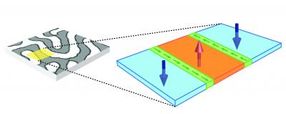
Development of energy saving technologies is one of the central pursuits of modern science. From advancing alternative energy resources like wind and solar power to improving the infrastructure of the electrical power grid, this pursuit by scientists and engineers takes on a variety of forms. One focus in recent years has been eliminating energy loss in the transmission of power itself, which by some estimates consumes more than 10% of all energy being produced. The research team has demonstrated a new material - a magnetic topological insulator - that can eliminate this loss.
The work by the RIKEN/UT collaboration is closely related at a landmark discovery from the 1980s, the so-called quantum Hall effect. That effect is known to produce dissipationless electricity channels, but it requires large, cumbersome magnets to produce fields 100,000 larger than the earth's magnetic field for its operation. The RIKEN/UT collaboration circumvented this difficulty by using an exotic type of semiconductor predicted to exhibit a similar effect. In contrast to the quantum Hall effect, this effect, known as the quantum anomalous Hall effect, stems from the semiconductor's own magnetization rather than from an external one. At the heart of this new phenomenon is the interaction between magnetic ions and the topological insulator's current carrying particles (known as Dirac fermions), the latter of which are unique because they behave as if they have zero mass.
The devices produced by the RIKEN/UT team are a robust "proof of principle", demonstrating that this new type of dissipationless transport can be harnessed in prototype transistors. While currently requiring cryogenic conditions, improvements in materials design promises to improve the stability of the magnets, making it possible to operate them at higher temperatures. By doing away with external stimuli such as magnetic fields and, in the future, cryogenic cooling, these new magnetic topological insulators may represent the most efficient path to modernizing the power grid by eliminating loss in energy transfer.
Other news from the department science

Get the chemical industry in your inbox
By submitting this form you agree that LUMITOS AG will send you the newsletter(s) selected above by email. Your data will not be passed on to third parties. Your data will be stored and processed in accordance with our data protection regulations. LUMITOS may contact you by email for the purpose of advertising or market and opinion surveys. You can revoke your consent at any time without giving reasons to LUMITOS AG, Ernst-Augustin-Str. 2, 12489 Berlin, Germany or by e-mail at revoke@lumitos.com with effect for the future. In addition, each email contains a link to unsubscribe from the corresponding newsletter.
